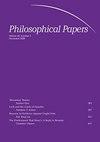论弗雷格哲学思想的构成性
IF 1.3
3区 哲学
0 PHILOSOPHY
引用次数: 1
摘要
摘要在这篇论文中,我提出了一种新的方法来看待弗雷格关于复合性原则、它与命题整体主义的关系以及概念的形成的观点。其主要思想是区分构建逻辑完美语言的三个阶段。在第一阶段,只有一个句子作为一个整体来表达一种思想。不可能将意义赋予不那么复杂的单元。这是一种普通语言的阶段。第二阶段涉及逻辑上完美的语言的适当构建水平。为了解释推理关系,我们不得不区分句子的句法和语义部分。我们可以区分句子各部分的意义和指称。此外,在这里可以在分析特定思想的不同方式之间进行选择。最后,在第三阶段,语言的每一种表达都有一种明确的意义,这种意义决定了一种独特的参照。逻辑上完美的语言已经准备好了。我们可以把思想看作是由原始元素组成的。此外,句子各部分的意义与思想的各部分相对应,从而使句子的结构成为思想结构的图像。复合性原则得到了满足,我们可以辨别理解无限数量的思想是如何可能的,以及语言是如何学习的。所提出的观点的主要优点是,它允许容纳弗雷格哲学的某些方面,这些方面通常被视为相互矛盾。此外,我提交了大量的文本数据,以支持所讨论的观点和概念。本文章由计算机程序翻译,如有差异,请以英文原文为准。
An Essay on Compositionality of Thoughts in Frege’s Philosophy
Abstract In the paper, I propose a novel approach to Frege’s view on the principle of compositionality, its relation to the propositional holism and the formation of concepts. The main idea is to distinguish three stages of constructing a logically perfect language. At the first stage, only a sentence as a whole expresses a Thought. It is impossible to assign meaning to less complex units. This is the stage of an ordinary language. The second phase concerns the proper level of construction of a logically perfect language. We are forced to discriminate syntactic and semantic parts of sentences to account for the inference relations. We can distinguish senses and references of parts of sentences. Furthermore, it is possible here to choose between different ways of analysing the given Thought. Finally, at the third stage, every expression of the language has an unambiguous sense and this sense determines a unique reference. The logically perfect language is ready. We may view Thoughts as composed from primitive elements. Moreover, the senses of parts of a sentence correspond to the parts of a Thought, so that the structure of the sentence serves as the image of the structure of the Thought. The principle of compositionality is met and we can discern how understanding of the infinite numbers of Thoughts is possible and how languages are learnable. The main advantage of the presented view is that it allows accommodating some aspects of Frege’s philosophy that are often seen as mutually incompatible. Furthermore, I submit extensive textual data in favour of the discussed views and conceptions.
求助全文
通过发布文献求助,成功后即可免费获取论文全文。
去求助
来源期刊

Philosophical Papers
PHILOSOPHY-
CiteScore
2.10
自引率
0.00%
发文量
18
期刊介绍:
Philosophical Papers is an international, generalist journal of philosophy edited in South Africa Original Articles: Articles appearing in regular issues are original, high-quality, and stand-alone, and are written for the general professional philosopher. Submissions are welcome in any area of philosophy and undergo a process of peer review based on initial editor screening and refereeing by (usually) two referees. Special Issues: Topic-based special issues are comprised of both invited and submitted papers selected by guest editors. Recent special issues have included ''Philosophy''s Therapeutic Potential'' (2014, editor Dylan Futter); ''Aging and the Elderly'' (2012, editors Tom Martin and Samantha Vice); ''The Problem of the Criterion'' (2011, editor Mark Nelson); ''Retributive Emotions'' (2010, editor Lucy Allais); ‘Rape and its Meaning/s’ (2009, editor Louise du Toit). Calls for papers for upcoming special issues can be found here. Ideas for future special issues are welcome.
 求助内容:
求助内容: 应助结果提醒方式:
应助结果提醒方式:


